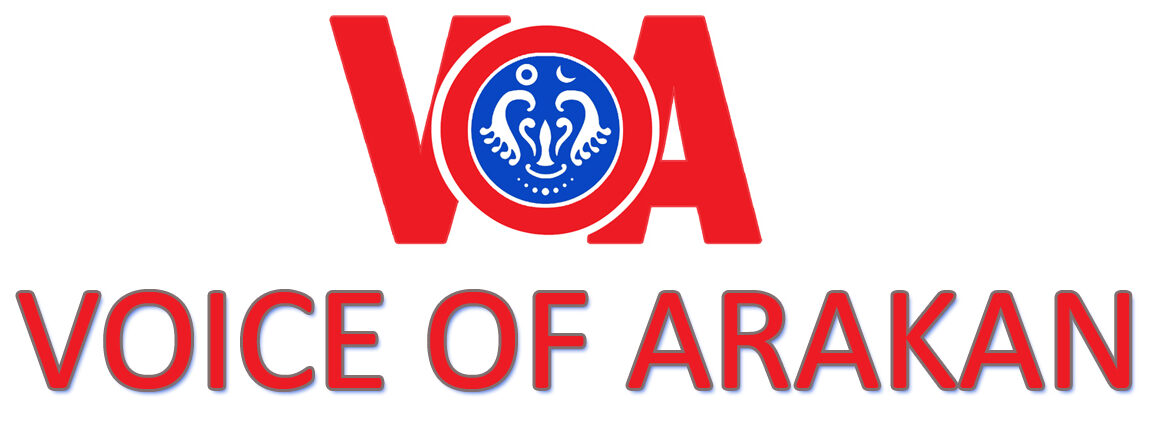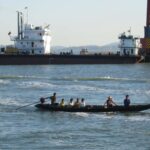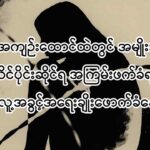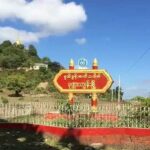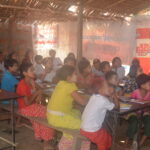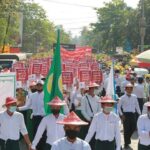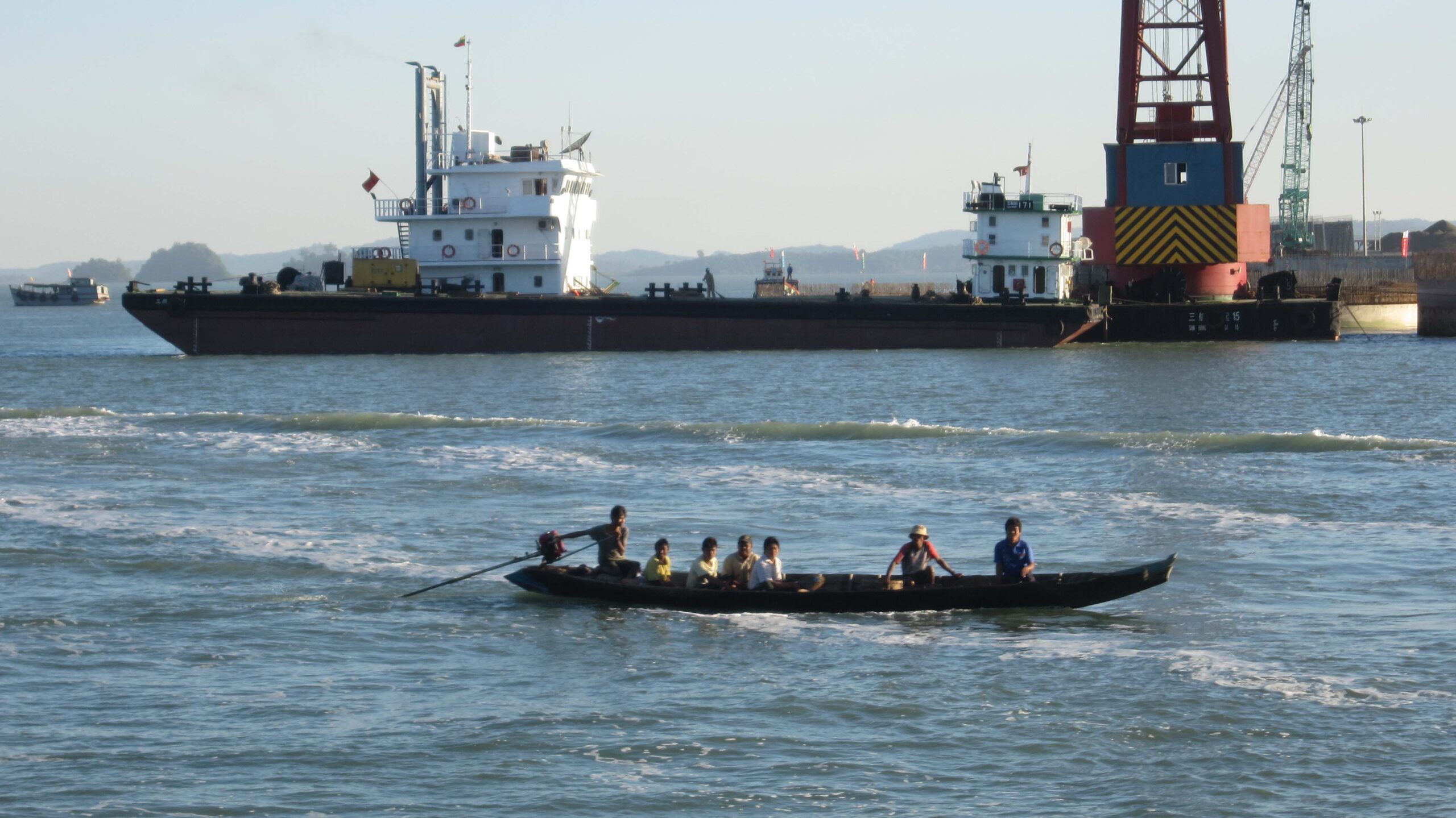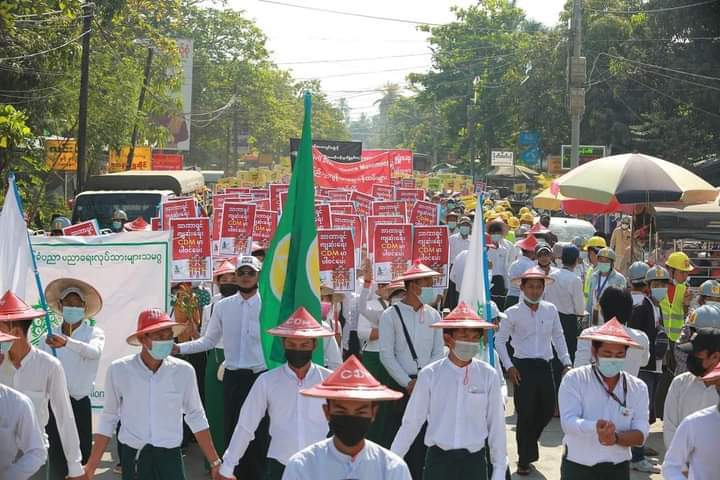Mrat Noe Thar
18-02-2013
The reflected images of the Rakhine mountain range waving in the bluish Kyauk Phyu river. A small motor boat was unveiled under bright sun. We could see Maday Island, 8 miles away to the east from Kyauk Phyu. We recognized small huts of local residents indistinctly between Project Building of CNPC (China National Petroleum Company). Fishing boats were oddly vanished in the river.
“Fishing has been banned here. The company restricted fishing swaths near the project area, not to interrupt the project. Fishing is the majority business of Maday island and also the fish source area of Kyauk Phyu area. Our business and income depend upon fishery, we had a small limited area of land, farm and paddy field but almost all was oppressively grabbed by the gas pipeline project, now we all are in a livelihood crisis.” elucidated by a Maday islander in the boat.
I sorrowfully ask him about theiPoverty amongst abundancer contemporary livelihood. He explained “Some people go abroad to find jobs, some become migrant workers in the region, some become general workers in project sites. It was not easy to get job as a general worker, when islanders planned a campaign against the project, the project assigned residents as general workers.
We reached Maday jetty at about 1:00 p.m. We noticed that women were carrying rock and stone. They were from child to aged.
Daw Aung Hla Nu seems to be over 50 years old, and lives in Kyauk Tan village, a general worker told “We, all the local residents, were solely allowed to work as general workers. They assigned us to carry construction rock and stones. We have to wait until they call us to carry stones with carrier boxes. If we don’t get any assignments we get no income. 2000 Myanmar Kyats per day for a woman and 3000 for a man. It is a discrimination, we had to do the same work at the same time altogether, but the wages were discriminated by gender.”
We regretfully saw that Maday islander residents were living in a mysterious situation of poverty though foreigner-workers of the project were fully facilitated with electric light, clean water and secure buildings. Local resident workers were to stay poorly in small shacks beside the dusty road. They could stay on this island securely before the project. With the people concerned, the deep-sea port construction project continued arrogantly day and night.
We left Maday after one hour of exploration on the island, and we led to the Thamban Chaung village. We reached at about 3:30 p.m. We found an oil and gas pipeline construction site of Punj Lloyd Company of India at the jetty. I found foreign workers, local workers and security persons altogether living in 10 huts.
One of my Rakhine friends, who served us lunch, explained the situation of the project, “As the pipeline construction project is near to its end, the workers lessened. There were many workers in the project before.”
It took us an hour to walk into the village from the jetty. The paddy field was reddish in the sunset, a sign of pollution by salted water flood. Our journalist took photos of this displeasing scene momentarily.
We reached Thamban Chaung, where over a thousand households reside, after sunset, feeling weary. A villager told me that there was no GSM network in this area when I was trying to contact my Journal’s newsroom.
The villagers gathered around us, journalists, when we reached there. “You might see a damaged embankment near our village known as Let-khwar-dwe embankment. There were 161 peasants that relied on it for cultivation. Oil and gas pipelines passed through, breaking the embankment, and flooded with salted water. We could not cultivate any crops there. We didn’t receive any indemnification for damage. The authorities didn’t take action for it. These were cause for concern and we were to sell our properties such as pieces of gold or cattle for our food security.” mournfully said by 77 years old peasant U Aung Kyaw Tun.
U Tun Kywel, a member of Myochaung regional development committee, elucidated us “We were disappointed that such an India company neglected democracy and human rights, it was in disgrace to do such neglect to residents’ deprivations. It needs to fulfill residents’ deprivations and regional development in advance to implement projects internationally.”
Although the actual area of Gabine Chaung or Let-khwar-dwe embankment was 1824 acres, only 750 acres were registered for land ownership. Embankment was broken by passing through the oil and gas pipeline, the cultivable land was flooded with salty water and damaged. The company was responsible for damages and ignored. The company didn’t pay indemnification for damage of crops and land for about 2 years.
The resident monk of Gabine Chaung monastery explained, “I met responsible persons of Punj Lloyd company last month. They promised us that they will manage deprivation of the resident villagers and they will provide development assistance to the village. But the project will be ended within the coming two months, I see no actions as they promised and suspected if they deceived. I heard they provided 200 bags of cement and 5 lakhs to the village administrator. Then they coerced villagers to construct a drainage, the villagers will be levied 5000 Kyats fine if absent in construction. It was an exploitation. As my opinion, the company should take responsibility to restore the embankment demolished to complete the gas pipe line.
The next day, we proceeded to Ann township via Thabu Changi village where we spent the night. The villagers gathered around and told us about land grabbing by pipeline projects and the military, and indemnification for land and crops.
Our group of journalists continue our journey to Ann via Tat Taung. 10 miles long Tat Taung to Ann Road is very rugged. Many peasants came to us where we were lodging in Ann Myothit (New Ann town). They opened their hearts as there was no one who would pay attention to how they were bullied, grabbing their land without indemnification by military and oil and gas pipeline project made them jobless.
According to their elucidation, I realized that they didn’t receive indemnifications, payments did not align with the MOGE’s (Myanmar Oil and Gas Enterprise) approved indemnification limit. Most vulnerable people including family members of military service persons and retired veterans accepted a lesser amount under limitation, and intentionally paid to deceive land-owners.
“My family has planned to cultivate agriculture and livestock breeding after my husband retired from military service for sustenance. We purchased a plot from a friend. The plot was taken over by project. We went to MOGE to claim indemnification for it. They denied. They warned and menaced that my husband will be dismissed as a military sergeant, or will not be promoted as warrant officer.” anxiously said by Daw Cherry Moe, wife of a military sergeant of LIB (372) under western command.
U Wanna Saw, lived in Aukywa, Ann township, a retired military corporal, feeling disappoint and said “I owned 2 acres of land, officials of pipe line project surveyed in my plot to pass through pipe line without notifying. I declined to sign on their survey document. Then they invite me to survey in my presence. They recorded my land area, numbers of cultivated plants, they added another two peasants’ plants in my area. When they recompense for land and plants, the other two received fully but I received for only 0.74 acres of totally 2 acres.
We have recognized that military land grabbing, human right abuse and less payment for pipeline indemnification incidents were at the very most in the Ann township. The vulnerable peasants said that although they wished to open their hearts to journalists and media, they were jeopardized and didn’t dare to come to meet any journalist.
Central Committee member of Rakhine National Development Party Daw Thwe Thwe Soe explained concerning these issues, “Too many military battalions based in Ann township. Residents were always scared of authority. They’ve never complained or protested. But I received complimentary letters from them.”
We met resident peasants of various races, Rakhine, Chin, etc… We record and photograph along pipelines passing through. We could experience the pleasant nature and scenery of Ann town.
We continued our trip to Taung Goke with a bus passing across the mountain range, known as “Pho Khaung” in Rakhine language, after a 2 days visit in Ann. I was thinking about our Rakhine’s natural resources. The construction project to churn out natural gas and natural resources will be completed sooner. Although Rakhine is wealthy with natural gas, why were the Rakhine people living in such poverty? I was overwhelmed with the voices of people alongside the pipeline, after the trip to Kyauk Phyu and Ann townships.
